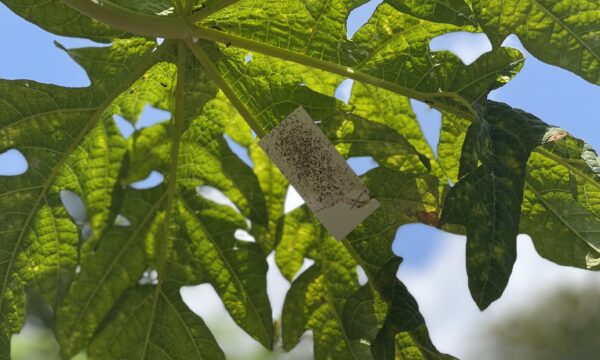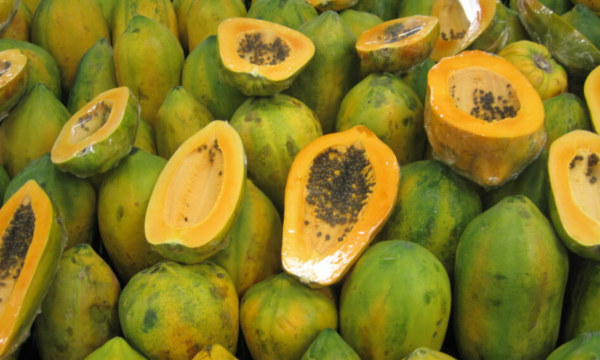A research team led by the Beijing Academy of Agriculture and Forestry Sciences have produced the complete genomic sequence of watermelon (Citrullus lanatus). It is hoped that the genomic data from this study will shape future research into watermelon genetics and provide a good resource for crop genetics and future plant breeding projects, resulting in improved watermelon cultivars with a greater degree of pest resistance.

Watermelons suffer large yield losses due to many pests and diseases and it is hoped that new genetic research can be used to improve varieties to make them less susceptible to pathogens ©Steve Evans via Wikimedia Commons (License CC-BY-2.0).
Watermelon is an important cucurbit crop worldwide and is among the top 5 most consumed fresh fruits, with a worldwide production of 90 million tonnes per year. The Plantwise Distribution Map has over 100 records of watermelon, showing the global distribution of its production throughout South America, Europe, Asia, Africa and the Middle East. Although the fruits of modern watermelon varieties come in a range of shapes, sizes and colours, years of cultivation and selective breeding for certain desirable traits has led to a narrowing of the genetic base, resulting in a major bottleneck in watermelon improvement. Many watermelon cultivars have a narrow genetic diversity and are susceptible to a range of insect pests and fungal, bacterial and viral diseases such as bacterial blotch, Fusarium wilt and Phytophthora blight. Consequently, knowledge of the genome sequence is vital for crop improvement.
This study revealed that wild watermelon cultivars contain greater genetic diversity than farmed watermelon varieties, which suffer significant losses from pests and diseases. The results of the study support the hypothesis that many of the disease resistance genes have been lost during watermelon domestication. It is thought that this research will serve as a tool for better exploring the mechanisms underlying pathogen resistance and desirable traits in watermelon in order to improve watermelon breeding.
The whole watermelon genome sequencing project has been deposited on DNA Database of Japan (DDBJ), the European Molecular Biology Laboratory (EMBL) and GenBank so is publicly available.
For more information on diagnosis and management of pests and diseases of watermelons and other cucurbits visit the Plantwise Knowledge Bank.
References:
Guo, S., Zhang, J., Sun, H., Salse, J., Lucas, W., Zhang, H., Zheng, Y., Mao, L., Ren, Y., Wang, Z., Min, J., Guo, X., Murat, F., Ham, B., Zhang, Z., Gao, S., Huang, M., Xu, Y., Zhong, S., Bombarely, A., Mueller, L., Zhao, H., He, H., Zhang, Y., Zhang, Z., Huang, S., Tan, T., Pang, E., Lin, K., Hu, Q., Kuang, H., Ni, P., Wang, B., Liu, J., Kou, Q., Hou, W., Zou, X., Jiang, J., Gong, G., Klee, K., Schoof, H., Huang, Y., Hu, X., Dong, S., Liang, D., Wang, J., Wu, K., Xia, Y., Zhao, X., Zheng, Z., Xing, M., Liang, X., Huang, B., Lv, T., Wang, J., Yin, Y., Yi, H., Li, R., Wu, M., Levi, A., Zhang, X., Giovannoni, J., Wang, J., Li, Y., Fei, Z., & Xu, Y. (2012). The draft genome of watermelon (Citrullus lanatus) and resequencing of 20 diverse accessions Nature Genetics DOI: 10.1038/ng.2470
Related News & Blogs
‘Sowing the seeds’ for food security in Uganda: CABI supports training for Quality Declared Seed production
CABI has been working with Zirobwe Agali-Awamu Agribusiness Training Association (ZAABTA), the Ministry of Agriculture, Animal Industry and Fisheries (MAAIF), the National Agricultural Research Organisation (NARO), and Integrated Seed Sector Developmen…
21 May 2025




